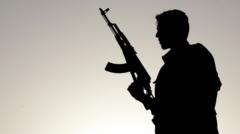The recent disarmament of PKK fighters represents a critical juncture in the decades-long struggle, raising hopes for peace in the region.
**Symbolic Disarmament: PKK's Move Towards Peace with Turkey**

**Symbolic Disarmament: PKK's Move Towards Peace with Turkey**
Kurdish PKK's ceremonial weapon burning signals a pivotal moment in the long-standing conflict with Turkey.
In a historic event marking a potential step towards peace, the outlawed Kurdish PKK has begun a disarmament process after forty years of armed conflict with the Turkish government. This significant ceremony, witnessed by around 30 PKK fighters including women and men, took place in a notable location in Iraqi Kurdistan, where the fighters placed their weapons in a fire as a gesture of goodwill and commitment to peace. The Turkish government has reacted positively, viewing this act as a significant threshold towards achieving a "terror-free Turkey."
Since the escalation of the Kurdish conflict in 1984, approximately 40,000 lives have been lost, and the PKK has been designated as a terrorist organization by Turkey and several Western nations. The ongoing disarmament is not merely a national issue; it could influence regional dynamics in Iraq, Syria, and Iran. During the ceremony, leaders and media were present to document the event, as the PKK emphasized its move as a transition from armed confrontation towards democratic engagement.
The initiation of this disarmament follows a call by the PKK’s long-imprisoned leader, Abdullah Ocalan, who has urged for a shift from armed resistance to political processes. In a significant moment, Ocalan, who remains a vital figure among Kurds, delivered a video message advocating for peace and the importance of political dialogue as a means to resolve the Kurdish issue. He has been incarcerated since 1999 and has historically played a pivotal role in Kurdish movements.
While this is not the first attempt at brokering peace between Turkey and the PKK, many see it as the most promising yet. A previous ceasefire was broken in 2015, leading to renewed violence and military campaigns against Kurdish forces. However, recent talks initiated by the Turkish government, including a historic letter from Ocalan directing PKK to disband, have paved the way for the current disarmament initiative.
In light of these developments, Turkish President Recep Tayyip Erdogan has indicated this moment serves as an "opportunity to take a historic step" towards eradicating terrorism within Turkey. As the peace process unfolds, discussions within Turkey's parliament are anticipated to determine future actions. Erdogan's handling of this sensitive situation will likely impact his political future, especially as he contemplates constitutional changes that may affect his tenure beyond 2028.
As the world watches the transformative potential of these peace efforts, the ramifications of the PKK’s disarmament could shift the trajectory of Kurdish rights and governance in the region, further enabling the transition from armed conflict to sustainable political solutions.
Since the escalation of the Kurdish conflict in 1984, approximately 40,000 lives have been lost, and the PKK has been designated as a terrorist organization by Turkey and several Western nations. The ongoing disarmament is not merely a national issue; it could influence regional dynamics in Iraq, Syria, and Iran. During the ceremony, leaders and media were present to document the event, as the PKK emphasized its move as a transition from armed confrontation towards democratic engagement.
The initiation of this disarmament follows a call by the PKK’s long-imprisoned leader, Abdullah Ocalan, who has urged for a shift from armed resistance to political processes. In a significant moment, Ocalan, who remains a vital figure among Kurds, delivered a video message advocating for peace and the importance of political dialogue as a means to resolve the Kurdish issue. He has been incarcerated since 1999 and has historically played a pivotal role in Kurdish movements.
While this is not the first attempt at brokering peace between Turkey and the PKK, many see it as the most promising yet. A previous ceasefire was broken in 2015, leading to renewed violence and military campaigns against Kurdish forces. However, recent talks initiated by the Turkish government, including a historic letter from Ocalan directing PKK to disband, have paved the way for the current disarmament initiative.
In light of these developments, Turkish President Recep Tayyip Erdogan has indicated this moment serves as an "opportunity to take a historic step" towards eradicating terrorism within Turkey. As the peace process unfolds, discussions within Turkey's parliament are anticipated to determine future actions. Erdogan's handling of this sensitive situation will likely impact his political future, especially as he contemplates constitutional changes that may affect his tenure beyond 2028.
As the world watches the transformative potential of these peace efforts, the ramifications of the PKK’s disarmament could shift the trajectory of Kurdish rights and governance in the region, further enabling the transition from armed conflict to sustainable political solutions.


















